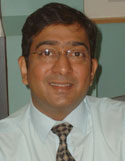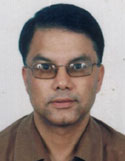Clean Energy Financial Institution opened Thursday as the country's first bank catering to the energy sector in partnership with Winrock International. CEFI will soon be renamed Clean Energy Development Bank. Marty Logan spoke to CEO Manoj Goyal (below, right) and Suman Basnet, director of Winrock's Renewable Energy Project Support Office.  Nepali Times: Why start this bank now, after six years of development)?
Nepali Times: Why start this bank now, after six years of development)?
Manoj Goyal: The country needs energy badly. Someone has to take the initiative, someone who understands the risks. A bank, with technical know-how is best placed to do that.
Suman Basnet: There has been investment in hydropower and it's been quite significant... however, one problem that banks themselves again and again express is that they don't have the technical competence to do due diligence or evaluate projects. With that expertise we'll be able to analyse a project, decide 'OK, this is a good project' and then put the project itself up as collateral for financing.
How will the partnership work?
SB: Technical assistance from Winrock is centred on increasing CEFI's capacity to be able to do project financing. That means setting up a procedure to evaluate projects, having manuals ready that people can refer to, maybe developing a roster of experts that the bank can tap into, setting up systems software that will help them do due diligence, etc.
Is CEFI's Rs 320 million paid-up capital sufficient?
MG: I'm not satisfied with that amount because this kind of development bank, with such a big agenda, will require more funds. We decided to go ahead with the minimum requirement first and then as we grow in the business we can always add on.  A green bank will understand the long-term investment needed in the energy sector. But are local investors prepared for things like venture financing?
A green bank will understand the long-term investment needed in the energy sector. But are local investors prepared for things like venture financing?
MG: In today's Nepal people are not used to it. But if you look internationally it has worked, so why shouldn't it work for us? It may be risky but there are returns. There has to be a time when you start using these tools... we are preparing the investors' minds for it. We won't be taking too many risks at the beginning; first we want to create one or two success stories.
Do you expect project developers to bring their ideas to you?
SB: We are trying to be proactive, especially in hydropower. We're looking at the different projects in the pipeline (up to 5MW), why they are not progressing, what the barriers are. Quite a few of them, I'm sure, are blocked because of financing... for instance, there is a developer who wants to develop a project but doesn't know anyone who could invest; there are investors who want to put in money but don't know where the projects are. This bank can very well act as a matchmaker.
Will you be limited to hydropower projects?
SB: Hydropower is going to be very important because of its potential here, but we will also finance other renewable energy technologies, especially off-grid rural projects like solar home systems, biogas plants, microhydro plants.
How are other commercial banks reacting to you?
MG: Banks are willing to finance the sector because they see it's a potentially lucrative one. But they're not sure about their exposure; they feel it's a risky venture because they lack the technical expertise. We have Winrock and USAID support, along with investment from the Employees Provident Fund, so we can afford that expertise; at the same time, we speak the banks' language. That combination provides a much higher comfort level for the other banks. We want to send them this message: utilise our services, because no single bank can finance a hydro project
With so much focus on energy, can you compete for traditional banking business?
MG: Energy will start paying us only after a few years. And we need to sustain ourselves, because investors' expectations are there. For that reason we'll go into traditional banking. But our wish will always be that energy takes over everything else.


